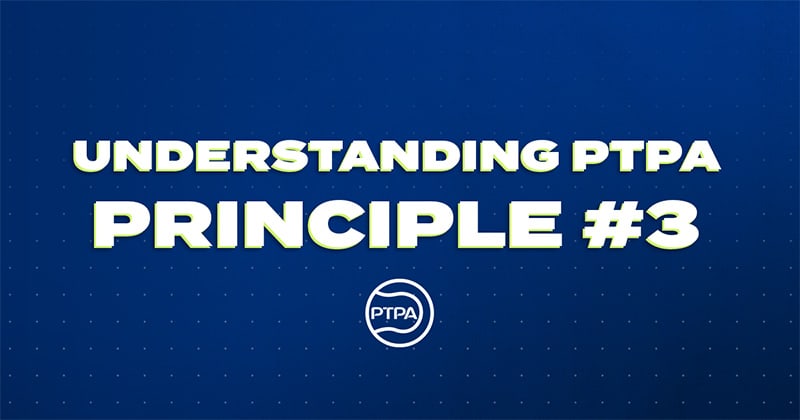
The third tenet of the PTPA Principles focuses on optimizing and protecting the rights of professional women’s and men’s tennis players worldwide. Tenet #3 includes six sub-categories of fundamental player rights and freedoms: publicity, privacy & personal data, equality of opportunity, freedom of expression, freedom of movement, and remedies. Here’s a deeper look at the third tenet of the PTPA Principles.
Principle 3a: Publicity
Tennis players are entitled to have their names, images, likenesses, and performances protected. A player’s name, image, and performance may only be commercially utilized with his or her voluntary, informed consent.
Every professional tennis player has his or her own personal brand made up of their name, image, likeness and performances (“NIL”). Players’ NIL and endorsements can be extremely powerful tools for commercial entities across industries; however, how players choose to deploy their NIL – and if they choose to deploy it all – must be the player’s decision alone. Public-facing figures like pro athletes face a higher risk of having their NIL utilized for commercial gain without their knowledge or consent, and pro tennis players must have protective mechanisms in place to help safeguard their name, image, likeness, and performance rights.
PTPA Principle – Publicity
Principle 3b: Privacy and Personal Data
Tennis players have the right to private life, privacy, and protection in relation to the collection, storage, and transfer of personal data.
Just because professional tennis players are public-facing figures, doesn’t mean they should lose their right to a private life or control over their personal data. Players have the right to dictate how much, or how little, of their private life they are comfortable sharing with the public, and fans, media, and other entities do not have the right to delve into the personal lives of players against their will and without their informed consent.
Similarly, players should have the right to protect and control their own data. This includes personal data, such as their phone number or address, and physiological or biometric data, such as their heart rate in a match or amount of sleep received the night before a match, for example. Players must be able to dictate and provide informed consent for when and how their personal data is collected, stored, and shared.
Principle 3c: Equality of Opportunity
Tennis players are entitled to equality of opportunity in the pursuit of sport, free of discrimination, harassment, and violence.
Tennis players are workers and, like all workers, they deserve to be safe and respected while at work. Discrimination, harassment, and violence directed toward players takes away from their ability to perform their job and threatens their physical and emotional wellbeing. Players must be protected from harassment, discrimination and violence so they can perform without fear or threat.
PTPA Principle – Equality of Opportunity
Principle 3d: Freedom of Expression
Tennis players have the right to freedom of opinion, expression, and association.
Another fundamental right of workers, including professional tennis players, is freedom of opinion and expression. Players must be able to share their opinions and ideas without fear of retaliation, censorship, or punishment. While there are some common limitations around freedom of expression if that expression is causing direct harm to others, for example, players should otherwise enjoy the same freedom of speech rights that are commonly recognized and protected in the workplace.
Principle 3e: Freedom of Movement
Tennis players have a choice of professional and commercial opportunities, as well as the freedom to travel and move freely in pursuit of these opportunities.
Tennis is a truly global sport, with tournaments spread across the world and professional tennis players constantly traveling between countries, continents, and time zones. In order to compete professionally, players must have their right to travel and freedom of movement protected, regardless of their country of origin or other personal factors.
Principle 3f: Remedy
Tennis players must be able to access an effective remedy, through agreed, rights-complaint dispute resolution mechanisms when their rights are not respected and upheld.
In the event that a player’s rights are violated, players must have transparent and easily-accessible procedures in place to flag and dispute the violation of rights and to hold violating parties accountable as necessary. A clear and consistent grievance procedure is crucial to providing players an additional level of security with their personal rights and freedoms. Without any effective remedy mechanisms in place, players have rights in theory, but remain unprotected in practice.
Stay tuned for a deeper dive into PTPA Principles tenets #4 and #5.